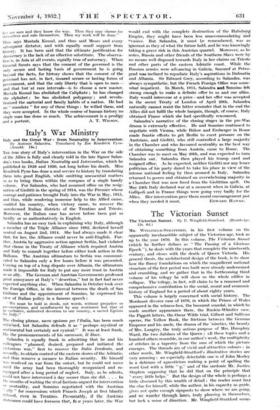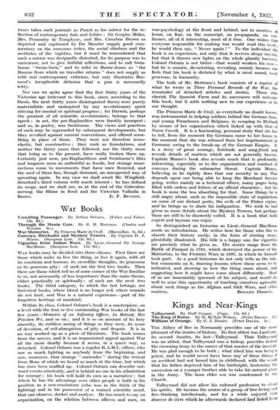The Victorian Sunset
Mn. WINGFIELD-STRATFORD, in his first volume on the apparently inexhaustible subject of the Victorian age, took us up to the year 1870. In this volume, The Victorian Sunset (which he further defines as "The Passing of a Glorious Epoch "), he deals with the years that complete the nineteenth century, and closes with the death of Queen Victoria. His general thesis, the architectural design of the book, is to show how the flimsy foundations on which the magnificent national structure of the first period was built were already undermined and crumbling, and we gather that in the forthcoming third volume of his trilogy he will show us the whole edifice in collapse. The trilogy, in fact, will claim to be a reasoned and comprehensive contribution to the social, moral and economic history of England for a period of about eighty years.
This volume is largely concerned with social history. The Mordaunt divorce case of 1870, in which the Prince of Wales appeared in the witness-box, the baccarat scandal, in which he made another appearance there, the Ruskin-Whistler case, the Piggott letters, the-Oscar Wilde trial, Gilbert and Sullivan operas, the Yellow Book, the frictions betwcen the German Emperor and his uncle, the drama of the 'nineties, the beauty of Mrs. Langtry, the truly serious purpose of Mrs. Humphry Ward, the two Jubilees of the Queen ; all these topics and a hundred others resemble, in our author's work, the multiplicity of stitches in a tapestry from the sum of which the picture emerges. The threads are of vivid and attractive colours : in other words, Mr. Wingfield-Stratford's illustrative stories are very amusing : an especially delectable one is of John Morley in a delirium of agnosticism making a point of spelling the word God with a little "g," and of the sardonic Mr. Justice Stephen supposing that he did that on the principle that every little helps." But the design of the whole is perhaps a little obscured by this wealth of detail : the reader must find the clue for himself, while the author, in his capacity as guide, gives not quite enough signposts to show where we are going, and we wander through lanes, truly pleasing in themselves, but lack a sense of direction. Mr. Wingfield-Stratford some- times takes such journals as Punch as his mirror for the re- flection of contemporary fads and foibles : Sir Gorgius Midas, Mrs. Ponsonby de Tompkyns, and Mrs. Cimabue Brown as depicted and captioned by Du Maurier supply good com- mentary on the nouveaux riches, the social climbers and the aesthetes of the 'eighties, but it must be remembered that such a mirror was designedly distorted, for its purpose was to caricature, not to give faithful reflections, and to call Swin- Mune "Swine-born," and to refer to Bume-Jones as "the Bourne from which no traveller returns" does not supply us with real contemporary criticism, but only illustrates Bur- nand's inexplicable delusion that a pun is necessarily Witty.
Nor can we quite agree that the first thirty years of the Victorian age (relevant to this book, since, according to the thesis, the next thirty years disintegrated them) were purely materialistic- and uninspired by any revolutionary spirit striving for mental or spiritual progress ; for Darwin, perhaps the greatest of all scientific revolutionists, belongs to that epoch : in art, the pre-Raphaelites were frankly insurgent ; and so, in poetry, was Swinburne. The views and practices of such may be superseded by subsequent developments, but they revolted against current conventions, and offered some- thing in place of them. They were not therefore icono- clastic, but constructive ; they rank as foundations, and neither the thirty years that followed, nor the thirty more that bring us to the present, have really broken them up. Certainly just now, pre-Raphaelitism and Swinburne's lilies and languors seem as unfruitful as fossils, but strange resur- rections come to movements that have once flowered, and the seed of them has, though dormant, an unexpected way of sprouting again. In any case we shall await Mr. Wingfield- Stratford's third volume with much interest : he has defined its scope, and we shall see, as at the end of the G6tterddm- tnerung, the Rhine in flood and the Victorian Valhalla in











































 Previous page
Previous page